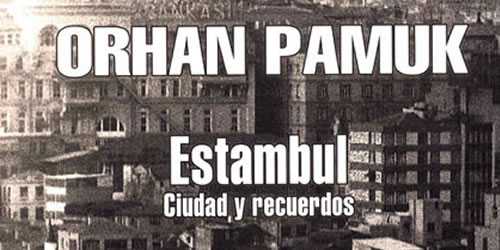Given the personal conviction of Orhan Pamuk, based on his first-hand experiences as an Istanbul-born, that the feeling that best serves to describe Istanbul in the last one hundred and fifty years, and notably from the disappearance of the Otoman Empire, is of bitterness, which has a lot of melancholy, or rather an essentially bitter melancholy. And the fact that this statement, in no way exclusive in relation to the unconditional love that Pamuk feels for the city, a true protagonist of some of his most important books, is not easy to digest for a number of his co-citizens, the Turkish writer has confessed to feel some sort of undeniable happiness every time that he reads of listens other say that melancholy is the most identifying attributes of old Byzantium, like it happens for example in the books of French writers who visited it in the 19th century most notably Gérard de Nerval, from who it can be said that he carried his ‘black sun of melancholy’ wherever he went. And, on his tail and always following his footsteps, his friend Théophile Gautier, author of a splendid book of articles titled ‘Constantinople’. They both contributed to make Pamuk feel vindicated for having wanted to speak so much about the feeling that this city produces to him, where he’s spend his entire life voluntarily.

Curiously, Nerval never piled on the agony when he talked about Istanbul in his ‘Voyage en Orient’. It’s just that the melancholy was stuck to his skin and his soul and, despite his attempts to distance himself from them, it was impossible to do so. When he arrived to Istanbul, at the age of 35, it hadn’t been long that his heart was a multicolour mosaic broken into a thousand pieces of sharp and cutting tiles. The actress Jenny Colon, the great love of his life which was never corresponded, had abandoned this world six months before and he already knew what it was like to live in a mental hospital. His periplus around the East, animated by the images put into movement by the romantic impulse of figures such as Hugo and Delacroix, it was a desperate attempt to forget, or to pretend he could forget, his precarious state. Hence he half invented a touristic and dreamy istanbul, and great part of the stories that he tells came out straight from his head, despite presenting them as real, debtor of the imaginary Thousand and One Nights.
Funnily enough, Gautier went a lot further and, disobeying the advice of his friend (who considered that it wasn’t necessary to go any further than the exterior façade of the city “which offered the most beautiful landscapes in the world”), he decided to use the same words as Nerval “go behind the scenes” thus accessing the heart of which, for Pamuk, makes Istanbul such an unbeatable melancholic city and, which has been so since then, making the reader feel with his admirable and seductive picturesque style (however, Gautier dreamt about being a painter until, at the age of 19, he read the ‘Orientals’ of Hugo) that at least half of the treasure of the city on the Bosphorus resides in that other non-touristic Istanbul.
Paul Oilzum Only-apartments AuthorPaul Oilzum
When you rent apartments in Istanbul you might want to take these books with you. Like all art which tells, they educate sight, allowing us to see and look with our own eyes.
via Orhan Pamuk Istanbul.

Leave a Reply